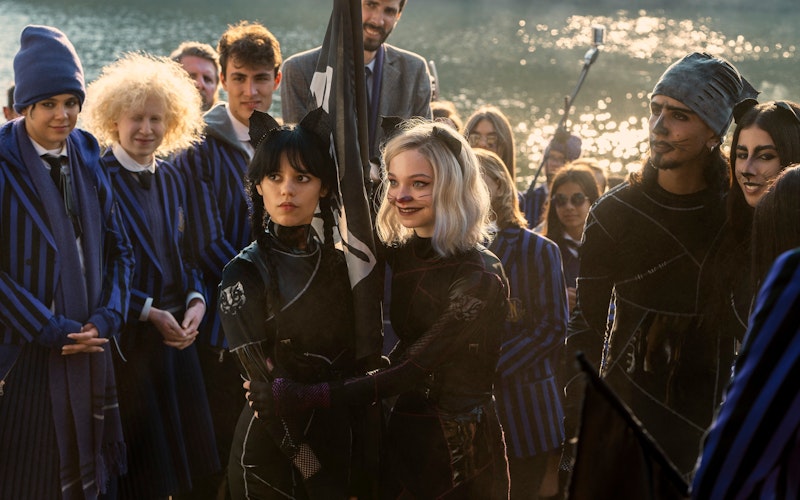
TV
Wednesday and Oneness
He's creepy, kooky, mysterious, and spooky—he's Tim Burton directing Wednesday, the recent Netflix series based on The Addams Family franchise.
After several failed attempts to assimilate into normal schools, Wednesday Addams (Jenna Ortega) is sent by her parents Gomez (Luis Guzmán) and Morticia (Catherine Zeta-Jones) to their alma mater, Nevermore Academy. According to theschool’s website, Nevermore is “an academic institution that nurtures outcasts, freaks, and monsters.” Morticia tells her daughter, “Finally you’ll be among peers that’ll understand you.” To her and Gomez’s dismay, they are wrong.
Ironically, the moody, apathetic Wednesday is assigned a roommate who is her bubbly antithesis. Enid Sinclair (Emma Myers) attempts to help her acclimate by explaining that the school is populated by four main cliques: Fangs (vampires); Furs (werewolves, like Enid); Stoners (gorgons); and Scales (sirens). Despite arriving with newly manifested psychic abilities and a plethora of talents, including being a skilled cellist with her own rendition of The Rolling Stones’ “Paint It Black,” Wednesday’s social awkwardness makes her the outcast of outcasts.
One could argue that Wednesday’s failed integration into Nevermore falls on her unwillingness to assimilate into the school’s culture. Not only was she enrolled against her will, but every group and activity is darkened by her alumna mother’s shadow. Wednesday warned her mother, “I have no interest in following in your footsteps.” Eventually, her unpredictable and uncontrollable psychic powers (a shared ability with Morticia) give her insight on a local murder and a purpose for sticking it out at Nevermore.
As executive producer and director of the first four episodes, Burton employs his signature juxtapositions, contrasting dark, muted tones against colorfully vibrant costumes and sets. A giant round spider-web window that is split down the middle divides Wednesday’s dour side of the dorm room from Enid’s, which resembles a kaleidoscope, to match her rainbow werewolf claws. Burton also cast Wednesday, Gomez, and Pugsley (Isaac Ordonez) with Latino actors. Wednesday’s Latinidad, which is expressed in her taste of music and embracing of Dia de los Muertos, serves as another point of juxtaposition in the ethnically binary, Black and White school. It is clear that Wednesday will have to learn to live in diversity in order to accomplish her greater purposes.
While checkered floors and bug-eyed beasts make their way once again into this Burton story, he turns to his trusted composer Danny Elfman (The Nightmare Before Christmas, Batman, Edward Scissorhands) to capture a tone that is both macabre and whimsical (and at times heartfelt), accompanying characters like Thing (Victor Dorobantu’s hand) and Uncle Fester (Fred Armisen) as they aid Wednesday in her investigation. Casting Christina Ricci in the role of botany teacher Marilyn Thornhill, as an homage to her portrayal as Wednesday in previous films, is a nice nod to the Addams faithful.
At first Wednesday’s differences and sociopathic tendencies create intrigue rather than distance. She learns that she can use the curiosity of others to help her solve the murders. Seeing her classmates as objects, she keeps them at an emotional distance. Enid eventually confronts her, saying, “You’ll use anyone to get what you want, even if it means putting them in danger.” This unsustainable model comes crashing down when Wednesday asks them to trust her beyond reason and they abandon her. Principal Weems (Gwendoline Christie) tells her, “I admire your ability to be your own person and trust your own instincts. But that also makes you impatient and impulsive.”
Wednesday is an emotional fortress. Even when she performs the dance that went viral outside of the series, she is careful to maintain her poker face. While she shows brief moments of rage, sadness, and fear, only Uncle Fester is trusted with a rare, unguarded smile.
Wednesday is an emotional fortress.
Community requires trust if we are to move beyond surface-level uniformity and embrace deeper unity. Consider Revelation 7:9-10. John, exiled to the island of Patmos and flooded with the sort of visions one would expect to come from Burton’s mind, sees a countless multitude before the throne of God and the Lamb. In uniformity they are clothed in white, waving palm branches. However, this multitude is not unified by ethnicity or culture, as they come “from every nation, tribe, people, and language.” Their unity is found in their praise: “Salvation belongs to our God.”
As clever as Wednesday is, gaining trust from the Nevermore community will mean more than adhering to the dress code and mostly obeying the rules. She will have to trust others, rather than treating them like servants to command. She’ll need to have a Revelation 7 experience: remain uniquely Wednesday, but unified with the outcasts in a shared worldview.
That is the goal for both Wednesday and the Christian. Revelation 7 is an inspiring thought, but it’s challenging to obtain. The Apostle Paul reveals in 1 Corinthians 12 that it is the responsibility of the Church to go beyond uniformity and live in unity. He compares the Church to a body, with each unique member carrying out its specific function to bring the body to proper health.
When Wednesday tries to make things right with others, it is clear that her motives are still tainted. A classmate, hurt by her approach, confronts her: “It’s about you. Every time you get involved, people get hurt.” The harsh frankness finally sinks in. (Slight spoilers ahead.)
Wednesday’s attempts at reconciliation may seem to fall short. But when we see where she’s come from, we recognize progress. Wednesday finds community only when she stands in unity with her peers, each using their unique abilities. At the end, Wednesday confesses, “I always believed relying on other people to be a sign of weakness. That inevitably they would lead me to disappointment. Turns out I’ve been the disappointment.”
Like Wednesday, we have a lot of room for growth. And like her, that growth is going to require putting trust in community in a way that goes beyond uniformity—one that ultimately finds unity in Christ.
Topics: TV